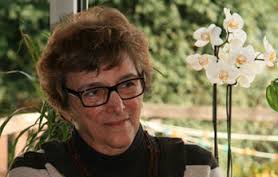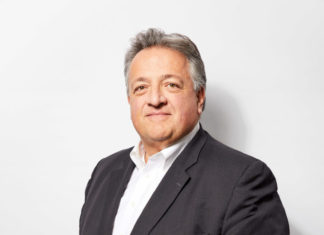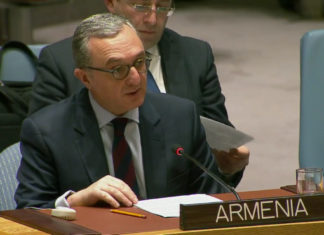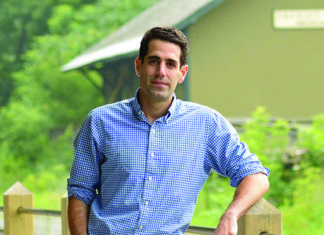
Special to the Mirror-Spectator
BERLIN — Much has been made of the fact that German leaders, both spiritual and political, broke the taboo and acknowledged the Armenian genocide by name. More importantly, in their April commemorations they used Germany’s moral authority to shape an approach that Turkey could embrace.
On April 23, an ecumenical service was held in the Berlin Cathedral, officially “In Commemoration of the Centenary of the Genocide of Armenians, Aramaeans, Assyrians and Pontian Greeks” with leaders of the Protestant and Catholic churches, the Armenian Apostolic, Greek Orthodox and Syrian Orthodox churches. Cathedral Preacher Dr. Petra Zimmermann struck the note that would resonate throughout the mass, saying what began in April 1915 could only be characterized as genocide and that in honoring the dead we preserve the memory for the future, so that such may never occur again.
Chairman of the Council of the Evangelical Church in Germany (EKD) Dr. Heinrich Bedford-Strohm introduced a second crucial theme, that of the German complicity. German military and diplomats, wartime allies of the Young Turks, had demonstrated shameful moral indifference. Most remarkable was his frank assessment of the role of the EKD; although Johannes Lepsius had fought to inform Germany about the events, “we cannot remain silent on the fact that the EKD knew but looked the other way.” Thus its “special responsibility” to work through the past, as a precondition for forgiveness. Only when we acknowledge our own complicity, can we encourage Turkey to process its own past, he said.
This signaled an explicit appeal to Ankara to benefit from Germany’s experience.
In his sermon, Cardinal Marx, head of the German Bishops Conference, argued against attempts to deny or relativize the genocide. The situation of the Ottoman Empire during the war may be understandable, he said, but not justifiable, or relativized as “events of war.” We do not remember the past in order to let it pass, nor should it imprison us or poison us. We acknowledge the past, to open a new beginning and find forgiveness. Germany’s having experienced forgiveness following recognition of the Holocaust stands as a model. The price, he said, is “the courage to be honest.” If the descendants of perpetrators must recognize the crimes of their predecessors, the descendants of the victims must respond not with revenge or hatred but forgiveness. Again, though in a sermon to the congregation, the Cardinal was speaking to the Turkish political class.
Following the mass, German President Joachim Gauck offered words of remembrance “to give the victims a voice.” Clearly characterizing it as genocide, he also spoke of the perpetrators, “the then rulers of the Ottoman Empire and their henchmen.” He said the Young Turk ideology of ethnic and religious homogeneity “developed a genocidal dynamic to which the Armenian people fell victim.” Distinguishing between the perpetrators, now long gone, and their descendants, who “cannot be found guilty,” he said, “what the descendants of the victims are rightfully entitled to expect is that historical facts, and thus historical guilt, are recognized.” Speaking from Germany’s experience, he stated, “we cannot free ourselves from guilt by denying, suppressing or trivializing it.” Acknowledging Imperial Germany’s role, he recalled the famous remark by Hitler, who asked, who speaks about the Armenians? “We are speaking about them!” Gauck answered. “We do this so that Hitler is not proved right.” In conclusion, he reiterated, “No one must be afraid of the truth.”
Parliament took a stand the next day. Opening the much-awaited debate Bundestag President Norbert Lammert was direct: “What happened in the midst of the First World War in the Ottoman Empire, before the eyes of the world, was genocide.” Echoing Gauck, but going further, he said, “We Germans are in no position to lecture anyone about how they should deal with their past. Yet,” he continued, “due to our own experience, we can encourage others to face their history, even when it is painful; self-critical commitment to the truth is essential for reconciliation.” This, he went on, “involves admitting the shared responsibility of the German Reich for the crimes committed a century ago”… which “is vital for our credibility in the eyes of both Armenia and Turkey.” For Lammert remembrance is vital to establish justice for the victims and their descendants. Referencing civil society activists in Turkey, he said: “They deserve our support. And they need it. Our debate today is intended to contribute to this.”
Subsequent discussion, in the presence of government representatives and many guest observers from the Armenian community and press, did not disappoint expectations. Spokesmen from the governing coalition of Christian Democrats (CDU) and Social Democrats (SPD) to the opposition Green Party and the Linke (Left Party) converged in their characterization of the genocide and the special role Germany, for historical reasons related to both world wars, can and must play in facilitating recognition and reconciliation. Each contributed to shaping the message to Turkey, whether speaking of Germany’s “historical complicity” for not having acted against the “genocidal deportations” (Frank Schwabe, SPD) or being an “accessory” (Ulla Jelpke, Left Party); whether asking Armenians for forgiveness (Christoph Bergner, CDU-CSU) or stressing the need to use the word genocide (Norbert Röttgen, CDU). They also displayed understanding of the psychological and ideological barriers to Turkish recognition, as did Cem Özdemir, Green Party Chairman, who stressed the need to support civil society activists in Turkey. Having acknowledged the Holocaust, Germans know only the Turkish government can break the cycle of denial (Dietmar Nietan, SPD) just as they know (Erika Steinbach, CDU) Hitler had taken the genocide as a model. Dr. Bernd Fabritius (CDU-CSU) added that no one could have imagined that after World War II Germany would have normal relations with its neighbors, not to mention Israel, but it did after Nazi crimes had been acknowledged. Turkey should “be more courageous” and cease responding with verbal vengeance.








